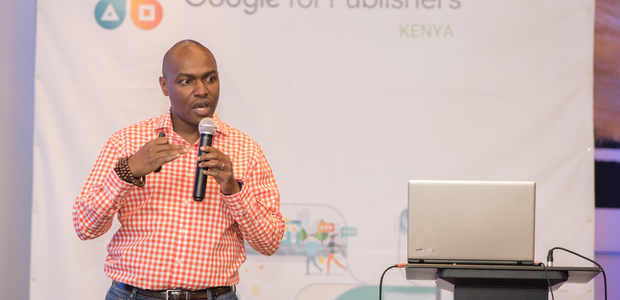advertisement
After Nigeria,Google hosts publisher’s summit in Kenya
Google has hosted over 100 online content publishers for a “Publishers Summit”, creating an opportunity for publishers to explore and…

Google has hosted over 100 online content publishers for a “Publishers Summit”, creating an opportunity for publishers to explore and better understand Google’s Publisher tools, as well as the challenges and opportunities presented by an online ecosystem growing rapidly in both size and complexity.
The Kenya summit comes after the Nigeria one, held on 8th and 9th May at Ikeja, Lagos.The summits are Google’s largest publisher-focused summit in Africa to date, and are aimed at helping Africa’s top publishers to explore and better understand Google’s Publisher tools, as well as the challenges and opportunities presented by an online ecosystem growing rapidly in both size and complexity.
Through its Summits, and other initiatives, Google is empowering publishers to make money online and drive traffic to their sites. In this way, the company aims to give publishers the necessary support to help them monetise their content online, thereby creating opportunities for the industry to leverage technology in the digital world.
advertisement
The Summit, which address the different issues being faced by publishers and advertisers, are designed to provide a more complete picture of the online ecosystem and the opportunities that lie ahead in 2017 and beyond. Key focus areas include the changing consumption journeys of online consumers as well as the tools available to publishers to optimise their benefits.
With Google having its 2016 goal of training 1 million young people (of which 400K were from Kenya) in Africa on digital skills within a year, there is even greater need for high-interest published content for online marketing as these web enthusiasts start their own ventures or assist other web entrepreneurs with theirs.
“Google Kenya is committed to adding value to the Kenyan people and businesses, by supporting their growth and development, as evidenced in our recent efforts of training more than 400K young Kenyans in digital skills. We continue to deploy tools and technologies that support businesses and individuals in Kenya to grow,” said Google Kenya Country Manager, Charles Murito.
advertisement
Google enables publishers to sell their content directly to consumers through Google Play Newsstand, which now features some 4000+ newspapers, magazines and blogs. And its search and ads services help publishers make money online and drive traffic to their sites. Google shared more than $11bn with its publisher partners in 2016.
In October 2015 Google joined publishers, analytics and ad tech companies and others to announce the Accelerated Mobile Pages Project to dramatically improve the mobile web for everyone.
“Google believes preserving a robust and independent press is important for society. When excellent journalism succeeds we all do better,” Murito comments. “This is why Google helps journalists use technology for reporting and acts as a collaborator and convener to listen and learn from those in the industry.”
advertisement
Other initiatives driven by Google to assist publishers includes the Google News Lab, which collaborates with reporters and entrepreneurs globally to help build the future of journalism, partner on projects, and build and adapt tools like Google Trends to help them in their work. In 2016 Google trained over 100 000 journalists directly.
In February 2016 it opened Operation Shield — a tool for news orgs and human rights groups to protect themselves from DDoS attacks — to all news organisations.
“We boost content discovery and understanding through diversity tags like ‘opinion’, ‘highly cited’, ‘local’ and ‘fact check’ along with tools like ‘Editors’ Picks’ in Google News to allow editors to highlight original news content they believe represents their organisation’s best journalistic work,” added Murito.
The Communications Authority of Kenya (CAK) estimates that out of the 37.5 million mobile phone subscribers in Kenya, approximately 25.6 million are using the internet. Recent CAK statistics (September 2016) also show that mobile data subscriptions account for 99% of Internet users. Moreover, 44% (nearly 13 million) are using smartphones for on-the-go internet access.
At the same time, the PwC Entertainment and Media Outlook: 2015-2019 (South Africa, Nigeria and Kenya), projects that total Internet access revenue for the mobile network operators will rise from KSH 95 billion (approx. US$930 million) in 2015 to KES 143 billion (approx. US$1.4 billion) in 2020, and mobile Internet access will account for more than 97% of this, as Kenyan consumers continue to derive their Internet experience from mobile devices.
Therefore, the increasing smartphone-use and data subscriptions presents an exciting opportunity for Small and Medium Businesses to advertise their businesses affordably online, as compared to advertising on traditional media. To attract traffic to their online assets, Publishers have to adopt online publishing tools like Google’s and deliver quality content in order to among others, get advertising spend from businesses.
“Online publishers are at the core of the web’s content industry, and it is crucial that they get all the support required for them to continue to “feed” the web with content, while also being assisted to grow their revenues and their businesses,” Murito concluded while speaking during the Publishers Summit.
Google’s innovative search technologies connect millions of people around the world with information every day. Founded in 1998 by Stanford Ph.D. students Larry Page and Sergey Brin, Google today is a top web property in all major global markets. Google’s targeted advertising program provides businesses of all sizes with measurable results, while enhancing the overall web experience for users. Google is headquartered in Silicon Valley with offices throughout the Americas, Europe and Asia.